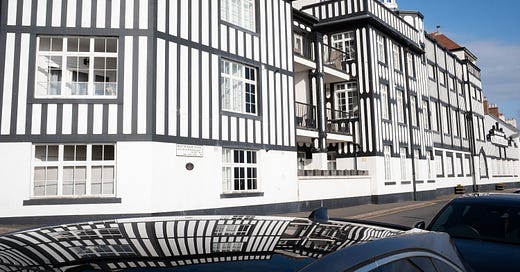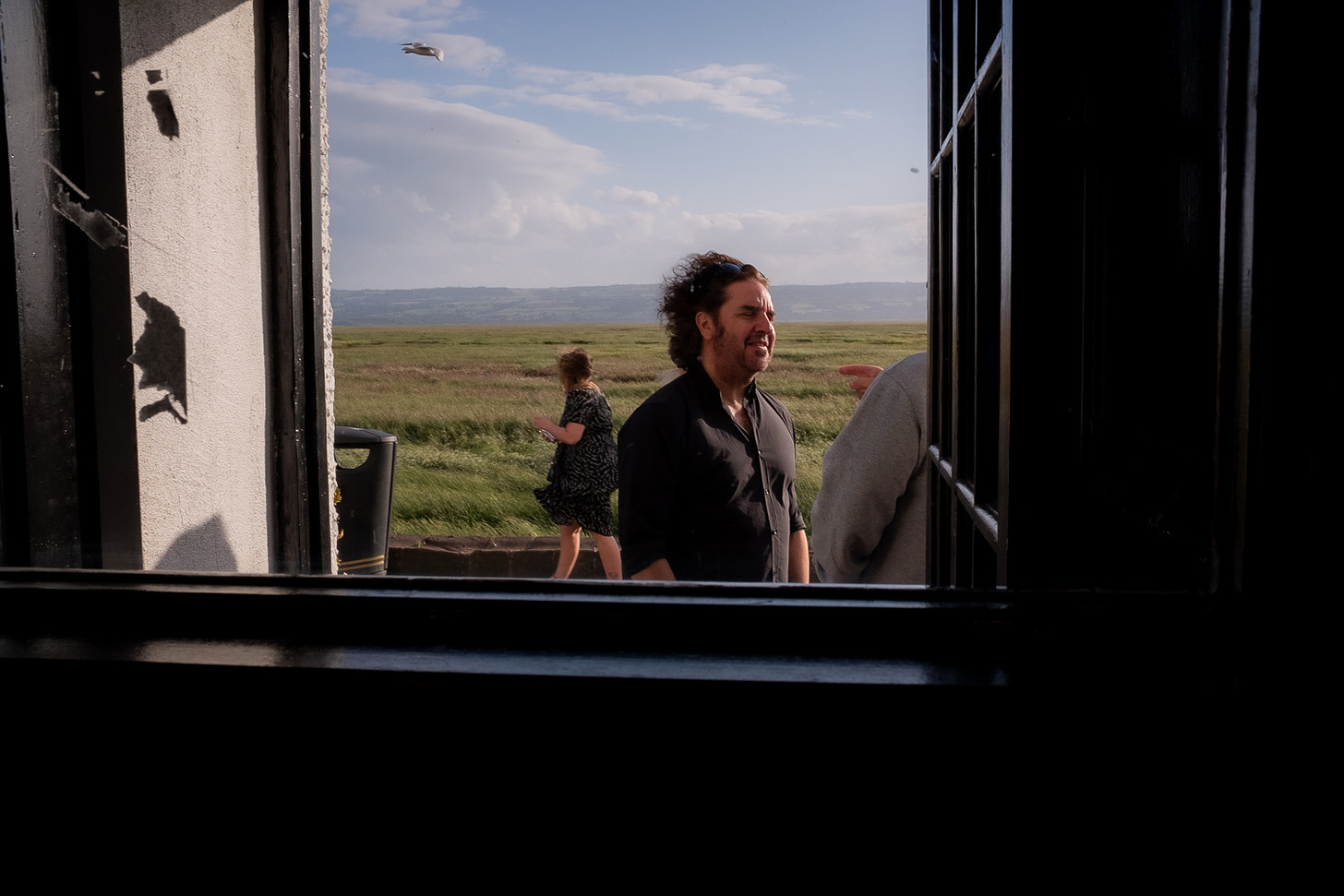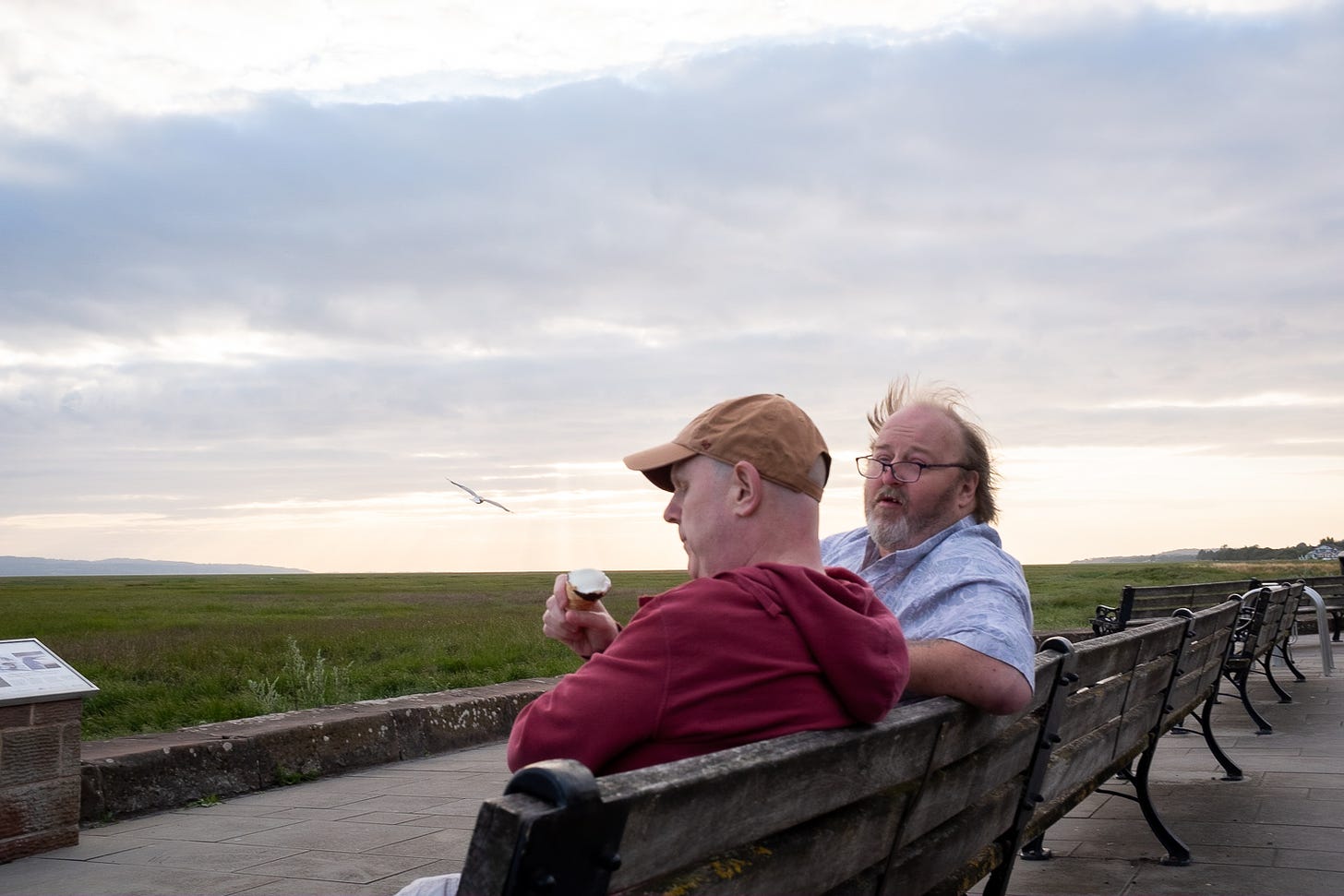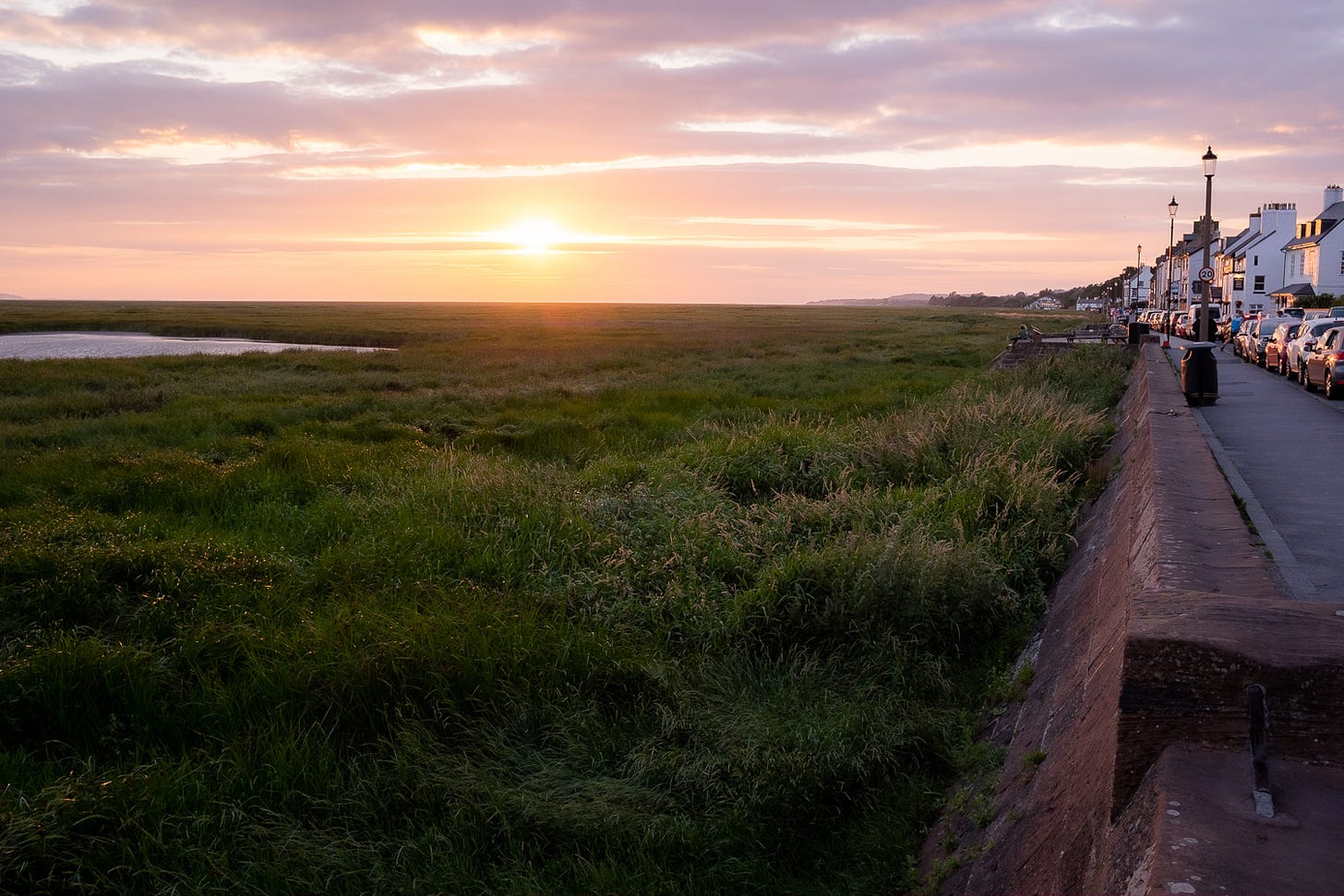A young man stepped along the verge towards me, leaning his shoulder into the hedge. The cars rushed past and made the leaves tremble around him. He had pink sunglasses in the shape of love hearts and his thick, black hair was cut in a mullet.
He introduced himself as Cam with an open, friendly manner and we turned to make for the car pulled over ahead. His dad pressed my palm with a cheerful handshake. His name was Tony and he worse sunglasses too. The two of them hosted me as if we were old friends.
We were on the Wirral. I’d left Wales behind though it was visible across the water. It looked a warm shade of pale green in the evening. The Tory MP had suggested I come to the Wirral. He said it had interesting architecture. I told Cam and Tony this and Cam said I should go to Wekka. “Wekka?” Tony replied, “Where the hell’s that?” “West Kirby dad!” In the end, they decided that I was better off going to Neston. I could get a good sense of the Wirral from there and the marshes were beautiful.
Cam told me he’d just come back from Manchester. He’d been there five years. He was at the Uni initially but he dropped out, staying in the city with his friends for a while. He sighed heavily and leant his mane on the headrest. “It was haaaard uni, it was hard.” Not everyone’s cut out for it, the lack of structure, the self-motivation. Cam said he definitely wasn’t. He ended up spending all day in bed and all night out. It wasn’t good for his mental health so he took a year out and got into teaching. He found the primary teaching exams hard too but now he was working in a nursery. He loved it. Cam wore his emotions and I imagined he would have been good with children. “I really love it,” he said warmly, “It’s great, I basically get paid to play with toy dinosaurs all day!”
There were tall trees on either side of the road and an occasional break showed a steady descent to the water and to Wales. Cam was off to a 23rd birthday party and Tony said that he should take me along. That was the way they were, eager to help and connect. The friend did the same party every year and Jack had come back home for it. He said it was nice to get everyone together and there’d be a BBQ and a cocktail-making station. People tended to sleep in tents in the garden afterwards. I didn’t go to in the end.
We dropped Cam, and Tony and I drove back to Neston. “I would have said come and stay but we’ve got some American cousins over. You’re more than welcome to pitch your tent in the garden if you like but I’ll drop you in Parkgate so you can see it. It’s a beautiful place, well worth seeing.”
We turned off the main road and began down the steady slope. We emerged behind the oak trees and the view expanded. The marshes lay yellow and behind them was the silver slick of the River Dee. “That’s the view I never get bored of,” Andy admired.
He told me about the history of the area. Neston used to be a port, bigger and more important than Liverpool, and ships would sail to London, Ireland, Spain or France. The river silted up though and soon its neighbour had outgrown it, swelling with the rising trade. “There was a lot of slave trading here,” Andy said, wanting to make it clear, “Liverpool made its money from black slaves. Not all of its money, but most of it.”
Parkgate was the village on the marsh front. It had grand timber-framed buildings that looked unlike any I’d seen. Perhaps that’s what the MP meant. When the quayside silted up and became a salt marsh, Parkgate became a popular bathing spot but nowadays you couldn’t swim there. The marsh was covered in thick tall grass that rippled back and forth, waves of yellow in the strong clear wind.
Andy dropped me in Parkgate with a list of pubs to try. Jack used to work in the Red Lion and said they were dead good in there and there were a string of others to sample. I should try the fish and chips, and ice cream too. There were two dairies, both were excellent.
I walked along the old seawall, feeling the bright, fresh air. Some evenings are exquisite, the light makes them so, and that was one of them. The wind was firm and furious, tossing hair and hats this way and that, but the light was so perfect it made it all feel peaceful. The buildings absorbed it turning them lilac; it played with the marsh, twinkling on the water and sweeping through the grass, and it draped itself on the distant Welsh hills like silk on the patchwork fields.
I had a pint of a local ale, recommended by a barman who asked, intrigued, about hitchhiking. He was friendly like everyone I’d met that day. I thanked him and sat on the waterfront. Two men were sitting on a bench nearby. They both held ice creams which they licked fervidly, cocked as they were, leaning against the bench. The sun was on their faces and they looked perfectly content. I smiled and said hello.
They were from Bebington, the town on the other side of the Wirral. They came over about once a week to get an ice cream and sit right where they were. They pointed to the two dairies. Both the shops’ signs were flapping, chasing the wind. “That one’s older,” the rounder man explained with a Scouse accent, “But the other one’s better. Nicolsons it’s called.” He was called Winnie and he had a grey-blonde beard and a shirt open to his chest hair. A tattoo on his forearm said Winnie. Kev wore a cap and had duckish eyes and his thin white legs were tucked beneath the bench.
“The Vikings landed here,” Winnie explained, “There was a big battle over there near where that power station is,” he pointed down the peninsular to the tall towers, orange in the glow, “Kev worked on the bridge next to it didn’t ya Kev?” Kev nodded, his nose buried in his cone, “There’s talk of building a bridge to Wales here but no one really wants that. All the bird life you know,” he nodded out to the marsh where the gulls were black bows silhouetted in the sunset, “We’ve got to think about their lives too. No point doing all that to shave off 20 minutes.”
We all looked out across the marsh and they continued at their ice creams, lapping them like a cat would its kittens. Standing there with them was the most natural thing in the world. I felt as if I’d known them a long time, as if I too came every week to eat my ice cream. Everyone on the Wirral was friendly I thought to myself.
They asked about my hitchhiking. “You get all sorts,” I replied, “I even had a Tory MP pick me up earlier today.” “Ha!” Winnie spluttered over the diminishing white boule, “Did he charge ya did he?” Kev cackled next to him.
“I hitchhiked to Wales when I was younger,” Winnie remembered, his arm still leaning on the back of the bench, “Me and a mate nicked a bike in some town, I can’t remember which. Anyway it turned out it was the vicar’s bike!” He laughed a cheerful, chesty laugh, “But we got round the corner and the tyre burst. God got his own back he did!” We all joined him in laughing.
I said goodbye and went back to the pub to return my glass and go to the toilet. A man pulled up to the urinal next to me. “I heard you’re writing a book about hitchhiking,” he said. The barman must have said. We got chatting as men sometimes do at urinals, and as men sometimes fail to do, neither of us weed. We both coughed awkwardly and moved to the sink in turn, hoping the other might not have noticed. We tried to talk naturally though neither of us was listening or concentrating on anything other than our joint emasculation. “Well good luck with it,” he said as we parted. I wasn’t sure if he meant the book.
Kev and Winnie were still on the bench as I set off to find a place to camp. I waved goodbye and they waved back, their ice creams finished at last.
“Good luck putting up your tent in this wind,” Kev called and I called thanks in return, clutching my hat. “Oh and put us in your book mate,” Winnie added with a twinkle, “We wanna be famous one day!”







